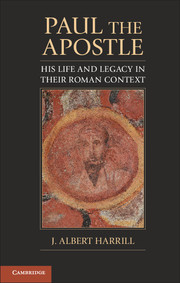Book contents
- Frontmatter
- Contents
- Figures and Boxes
- Preface
- Introduction
- PART I The Life
- PART II The Legend
- 4 Competing Stories about Paul in Late Antiquity
- 5 Paul the Scriptural Authority
- 6 How the West Got Paul Wrong
- Conclusion: Going beyond the Epitaph
- Appendix 1: Extant Writings Attributed to Saint Paul in Rough Chronological Order
- Appendix 2: Reconstructing Paul's Corinthian Correspondence: A Puzzle
- Appendix 3: Ancient Christian Works Containing Pauline Traditions and Legends
- Notes and Further Reading
- Bibliography
- Index of Biblical Citations
- Index
4 - Competing Stories about Paul in Late Antiquity
Published online by Cambridge University Press: 05 November 2012
- Frontmatter
- Contents
- Figures and Boxes
- Preface
- Introduction
- PART I The Life
- PART II The Legend
- 4 Competing Stories about Paul in Late Antiquity
- 5 Paul the Scriptural Authority
- 6 How the West Got Paul Wrong
- Conclusion: Going beyond the Epitaph
- Appendix 1: Extant Writings Attributed to Saint Paul in Rough Chronological Order
- Appendix 2: Reconstructing Paul's Corinthian Correspondence: A Puzzle
- Appendix 3: Ancient Christian Works Containing Pauline Traditions and Legends
- Notes and Further Reading
- Bibliography
- Index of Biblical Citations
- Index
Summary
If Paul was controversial in life, he was even more so after his death (ca. 62). We saw in the first part of this book, on the life of Paul, that his mission to Gentiles provoked conflicts with other Christians. As he defended himself, Paul advanced a particularly Roman discourse of “clout” (auctoritas) that asserted his personal authority over potential rivals. In this cultural sense, I argued, we may call Paul Roman. We now turn to the legendary Paul. Over time, the figure of Paul became Roman in a different way – in legal and political senses that imperial officials and other members of the aristocratic elite would have more likely acknowledged as one of their own. To support my thesis in this chapter and the next, I shall discuss quite different texts, from works attributed to Paul to arguments against his teaching, to uses of his writings in discourses and doctrines advanced by powerful ancient church figures (a full list appears in Appendixes 1 and 3). Despite their diversity, the texts represent Paul's growing influence on and significance in vastly different kinds of early Christianity.
We meet, first, Paul the Roman hero and model imperial citizen; in death, the apostle became a martyr venerated as the new Romulus and “second” founder of Rome. Next comes Paul the sexual role model, with whom early Christians debated the value of family, asceticism, and patriarchy. The third Paul in our survey is the Deceiver – Satan's apostle and the mad magician – whose details reflect late ancient anxieties about the figure's emergent fame.
- Type
- Chapter
- Information
- Paul the ApostleHis Life and Legacy in their Roman Context, pp. 97 - 119Publisher: Cambridge University PressPrint publication year: 2012



